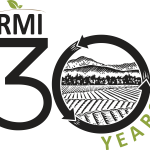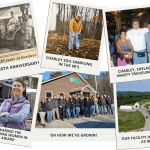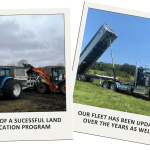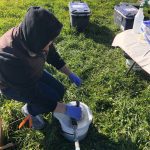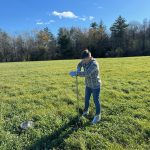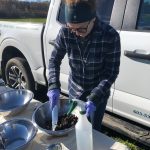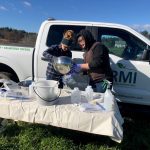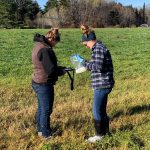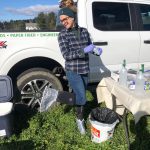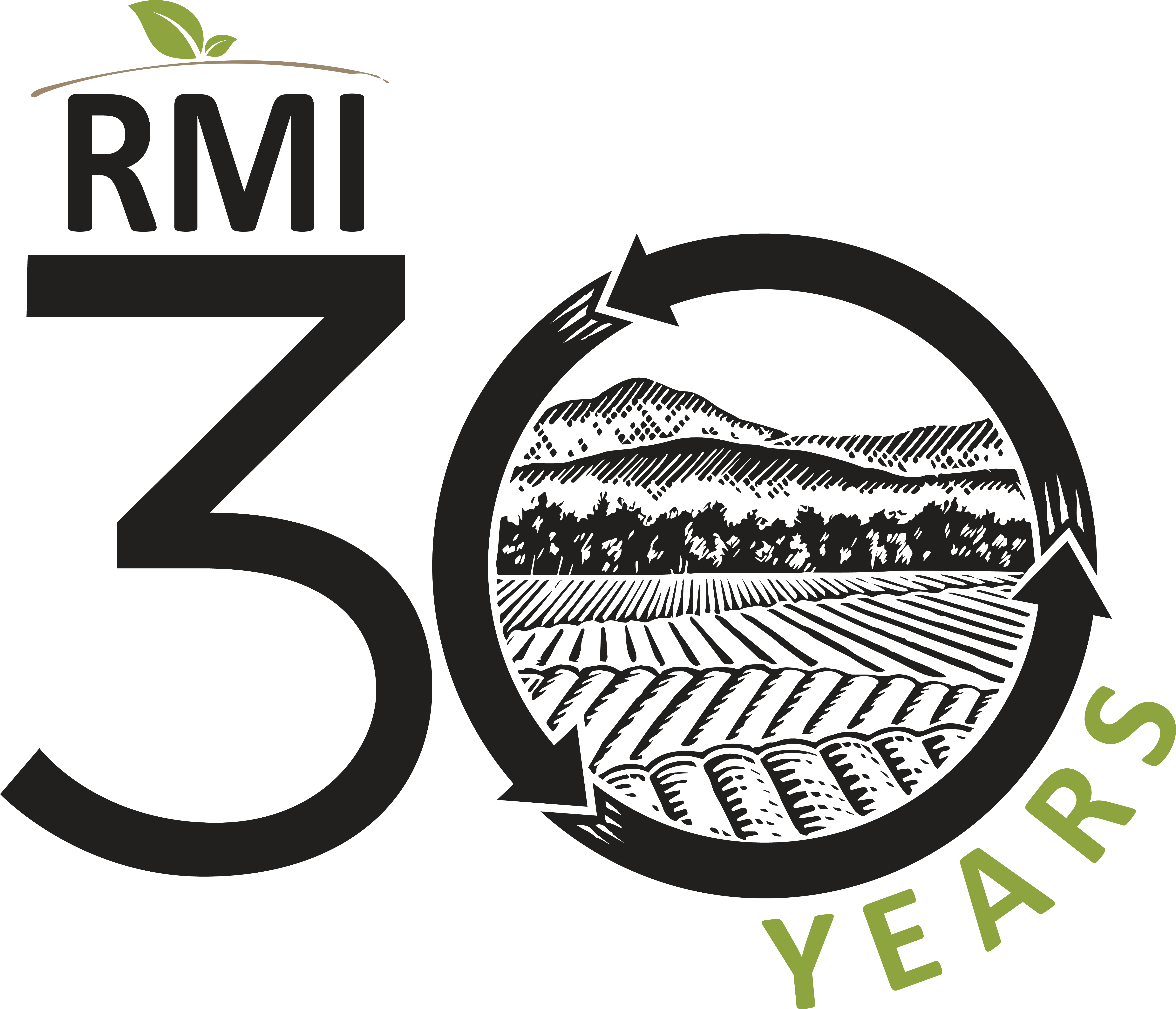
NH Drinking Water Festival Fun
This June, three of our team members volunteered for the NH 4th and 5th grade Drinking Water Festival held at Fox Park, where students had the opportunity to learn about water conservation, quality, erosion, wildlife, and many other facets of this natural resource by participating in many fun hands-on activities!
The RMI team ran the Superbowl Surge, an activity illuminating the effects of surges, or peak use times, on wastewater treatment plants and what we can do at home to alleviate some of the input. We also covered the 3 Ps of responsible flushing (one student suggested a fourth…puke!) and on top of covering which common materials should not be flushed, like paper towels, wipes, and cotton swabs, received additional student input such as siblings, sledgehammers, and explosives (All true.)
The entire event was a great way to combine learning with fun, and gave these future water stewards a better understanding of how they can conserve and protect this natural resource!
Celebration of Thirty Years
RMI’s first material generator was Bridgewater Power Company, a biomass power plant in Ashland, NH (who we still work with to this day!) that produces wood ash as a by-product of their operation. Wood ash became a staple for many New Englanders, used in composting operations, topsoil manufacturing, odor control at wastewater treatment facilities, and as a means of improving the pH of farm soil while adding the potassium and trace minerals necessary for successful crop yields.
From there, RMI (officially Resource Management Inc. as of January 1st, 2002) has continued to grow, relocating headquarters to Holderness, NH, and expanding internally to include Compliance, Sales, Operations, and Administrative Teams, as well as a Certified Crop Advisor and our own fleet of trucks run by professional highly experienced drivers.
The variety of industries that RMI has recycled material for has increased greatly as well, now including paper mills, drinking water and wastewater treatment plants, food processing plants, breweries, and many others. As a result, the selection of natural fertilizers available to our customers has expanded, and our land application programs have become some of the most robust in the Northeast.
2024 is officially our 30th year of operation and the entire Team is truly over the moon to celebrate this big milestone. We wouldn’t be where we are today without our partners, customers, and awesome staff, so a big thank you to everyone who has walked alongside us on this journey so far. In celebration of this milestone, we have also recently unveiled our official 30th anniversary logo which combines elements of both the original and the current company logos, symbolizing growth while maintaining the mission and core values of our company even thirty years later.
We hope you will celebrate with us throughout the year, and we look forward to another thirty years of building healthy soil with you all!
RMI Participating in National Study
We set off mid-morning to southern NH, truck loaded with an array of specialty equipment that had been fastidiously selected and supplied for this project, including high density polyethylene sample jars and buckets, steel mixing bowls and cleaning supplies, powderless nitrile gloves, PVD drop cloths, and a large stainless steel flighted auger. Our clothing and the cosmetics that we came in contact with that morning were also very mindfully managed, with outer layers composed strictly of well washed cotton fabric, and with no application of any lotions, Chapstick, or makeup to avoid interference with the sampling.
After pulling in to the 15-acre control field, we unloaded the truck and set up our portable laboratory for the morning. Two folding tables covered by the drop cloths provided us with a working surface where we laid out our equipment and notebooks, reviewed our plans, and prepared to start sampling.
We began by establishing and flagging three individual plots located no less than 25 feet apart from one another within the field. While standard sampling requires the use of a narrow soil probe, obtaining these samples was achieved by use of the hollow auger, which was capable of removing a soil “core” at varying depths. At each plot, we collected three unique cores; the first taken at a one-foot depth, the second at a three-foot depth, and the last at a sixth-foot depth if groundwater level allowed. Soil obtained between these measurements was disposed of away from the plots, and additional decontamination of the equipment was completed between samples. We also carefully secured samples of the water used during the decontamination process, as well as of the ground water on site.
The soil and water samples were each individually bagged and labeled with date, time, and location taken, and their next destination would be to the University of Arizona where they would be processed and analyzed along with hundreds of other samples taken similarly throughout the US. These will provide data for a long-term collaborative study by Dr. Ian pepper of the University of Arizona and Greg Kestor, the Director of the Renewable Resource Program at the California Association of Sanitation Agencies. The study aims to evaluate whether the land application of municipal biosolids (the treated and tested organic material recovered from the wastewater treatment process) is a significant source of per- and polyfluoroalkyl substances (PFAS) exposure. Testing for these compounds is a very delicate procedure, ergo the utilization of specialty equipment, as well as the avoidance of non-cotton outer layers and many common personal care items.
This study is a larger version of one completed in Yuma, Arizona, undertaken in response to a knee-jerk ban on the land application of biosolids in Pima County. The University of Arizona Water & Energy Sustainable Technology Center (WEST) and Pima County Wastewater collaborated, taking a critical look at whether the land application of biosolids served as a significant exposure pathway of PFAS. Researchers collected data on the movement of PFAS through soil in areas that had received long-term applications of biosolids. The data showed low levels of PFAS in the soil even in these long-term application sites, and a significant decrease of concentrations with depth, suggesting limited movement of PFAS through the soil. These findings were presented to the Pima County Administrator and Board of Supervisors, resulting in a decision to rescind the ban on land application.
After learning about this research, RMI was quick to volunteer our time and resources to provide local data for the study. As advocates for the responsible land application of municipal biosolids, we feel it is incredibly important to offer our support and to further expand the understanding of these compounds. Similarly, when concerns regarding metals arose, we worked directly with the University of New Hampshire to test and evaluate any materials of concern, ultimately finding only beneficial levels of these micronutrients. The results of the original study conducted by the University of Arizona WEST Center and Pima County Wastewater further support the safety and efficacy of land application of municipal biosolids. We feel confident that this national study will further assist in advocating for the beneficial reuse of these materials, and we will continue to provide support for this important collaborative venture over the course of the next few years.
Driver Spotlight
Meet Eythan Thurston. Eythan started with RMI in February of 2023 as a newbie in the industry. He trained one on one with our staff to get hands-on driving experience and to learn our unique industry, coming up to speed in no time at all.
Now driving RMI-18, a 2020 Peterbilt tractor trailer, Eythan services a variety of our Vermont customers. He transports wood ash, biosolids, and paper fiber with a level of professionalism and enthusiasm that is regularly complimented by both the farmers and the facility staff that we work with.
During his career, Eythan has delivered a total of 718 loads of material totaling 21,996 tons, and has driven a whopping 106,148 miles. Keep up the excellent work, Eythan!



